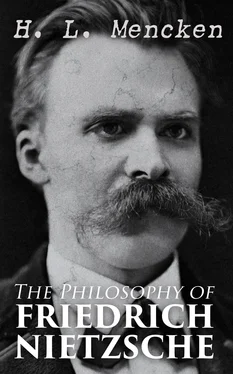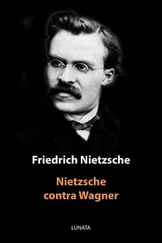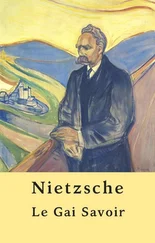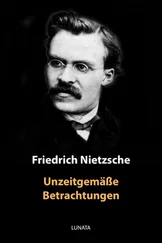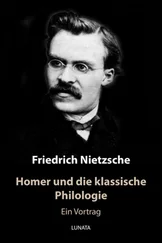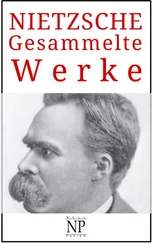"In the fall of 1888, he said of himself, in a reminiscent memorandum: 'My blood moves slowly. A doctor who treated me a long while for what was at first diagnosed as a nervous affection said: "No, your trouble cannot be in your nerves. I myself am much more nervous than you."'...
"My brother, both before and after his long illness seized him, was a believer in natural methods of healing. He took cold baths, rubbed down every morning and was quite faithful in continuing light, bed-room gymnastics."
At one time, she says, Nietzsche became a violent vegetarian and afflicted his friends with the ancient vegetarian horror of making a sarcophagus of one's stomach. It seems surprising that a man so quick to perceive errors, saw none in the silly argument that, because an ape's organs are designed for a vegetarian diet, a man's are so planned also. An acquaintance with elementary anatomy and physiology would have shown him the absurdity of this, but apparently he knew little about the human body, despite his uncanny skill at unearthing the secrets of the human mind. Nietzsche had read Emerson in his youth, and those Emersonian seeds which have come to full flower in the United States as the so-called New Thought movement—with Christian Science, osteopathy, mental telepathy, occultism, pseudo-psychology and that grand lodge of credulous comiques , the Society for Psychical Research, as its final blossoms—all of this probably made its mark on the philosopher of the superman, too.
Frau Förster-Nietzsche, in her biography, seeks to prove the impossible thesis that her brother, despite his constant illness, was ever well-balanced in mind. It is but fair to charge that her own evidence is against her. From his youth onward, Nietzsche was undoubtedly a neurasthenic, and after the Franco-Prussian war he was a constant sufferer from all sorts of terrible ills—some imaginary, no doubt, but others real enough. In many ways, his own account of his symptoms recalls vividly the long catalogue of aches and pains given by Herbert Spencer in his autobiography. Spencer had queer pains in his head and so did Nietzsche. Spencer roved about all his life in search of health and so did Nietzsche. Spencer's working hours were limited and so were Nietzsche's. The latter tells us himself that, in a single year, 1878, he was disabled 118 days by headaches and pains in the eyes.
Dr. Gould, the prophet of eye-strain, would have us believe that both of these great philosophers suffered because they had read too much during adolescence. It is more likely, however, that each was the victim of some definite organic malady, and perhaps of more than one. In Nietzsche's case things were constantly made worse by his fondness for self-medication, that vice of fools. Preparatory to his service as a hospital steward in 1870 he had attended a brief course of first-aid lectures at the military hospital at Erlangen, and thereafter he regarded himself as a finished pathologist and was forever taking his own doses. The amount of medicine he thus swallowed was truly appalling, and the only way he could break his appetite for one drug was by acquiring an appetite for another. Chloral, however, was his favorite, and toward the end he took it daily and in staggering quantities.
Meanwhile, his mental disturbances grew more and more visible. At times he would be highly excited and exalted, denouncing his foes, and proclaiming his own genius. This was his state when his friends were finally forced to put him under restraint. At other times he would show symptoms of melancholia—a feeling of isolation and friendlessness, a great sadness, a foreboding of death. The hostility with which his books were received gave sharpness and plausibility to this mood, and it pursued him through many a despairing day.
"An animal, when it is sick," he wrote to Baron von Seydlitz, in 1888, "slinks away to some dark cavern, and so, too, does the bête philosophe . I am alone—absurdly alone—and in my unflinching and toilsome struggle against all that men have hitherto held sacred and venerable, I have become a sort of dark cavern myself—something hidden and mysterious, which is not to be explored...." But the mood vanished as the words were penned, and the defiant dionysian roared his challenge at his foes. "It is not impossible," he said, "that I am the greatest philosopher of the century—perhaps even more than that! I may be the decisive and fateful link between two thousand centuries!" 1
Max Nordau 2says that Nietzsche was crazy from birth, but the facts do not bear him out. It is much more reasonable to hold that the philosopher came into the world a sound and healthy animal, and that it remained for overstudy in his youth, over-work and over drugging later on, exposure on the battle field, functional disorders and constant and violent strife to undermine and eventually overthrow his intellect.
But if we admit the indisputable fact that Nietzsche died a madman and the equally indisputable fact that his insanity was not sudden, but progressive, we by no means read him out of court as a thinker. A man's reasoning is to be judged, not by his physical condition, but by its own ingenuity and accuracy. If a raving maniac says that twice two make four, it is just as true as it would be if Pope Pius X or any other undoubtedly sane man were to maintain it. Judged in this way Nietzsche's philosophy is very far from insane. Later on we shall consider it as a workable system, and point out its apparent truths and apparent errors, but in no place (saving, perhaps, one) is his argument to be dismissed as the phantasm of a lunatic.
Nietzsche's sister says that, in the practical affairs of life, the philosopher was absurdly impractical. He cared nothing for money and during the better part of his life had little need to do so. His mother, for a country pastor's widow, was well-to-do, and when he was twenty-five his professorship at Basel brought him 3,000 francs a year. At Basel, in the late sixties, 3,000 francs was the income of an independent, not to say opulent man. Nietzsche was a bachelor and lived very simply. It was only upon books and music and travel that he was extravagant.
After two years' service at Basel, the university authorities raised his wage to 4,000 francs, and in 1879, when ill health forced him to resign, they gave him a pension of 3,000 francs a year. Besides that, he inherited 30,000 marks from one of his aunts, and so, altogether, he had an income of $900 or $1,000 a year—the sum which Herbert Spencer regarded, all his life, as an insurance of perfect tranquillity and happiness.
Nietzsche's passion and dissipation, throughout his life, was music. In all his books musical terms and figures of speech are constantly encountered. He played the piano very well, indeed, and was especially fond of performing transcriptions of the Wagner opera scores. "My three solaces," he wrote home from Leipsic, "are Schopenhauer's philosophy, Schumann's music and solitary walks." In his late youth, Wagner engrossed him, but his sympathies were broad enough to include Bach, Schubert and Mendelssohn. His admiration for the last named, in fact, helped to alienate him from Wagner, who regarded the Mendelssohn scheme of things as unspeakable.
Nietzsche's own compositions were decidedly heavy and scholastic. He was a skillful harmonist and contrapuntalist, but his musical ideas lacked life. Into the simplest songs he introduced harsh and far-fetched modulations. The music of Richard Strauss, who professes to be his disciple and has found inspiration in his " Also sprach Zarathustra " would have delighted him. Strauss has achieved the uncanny feat of writing in two keys at once. Such an effort would have enlisted Nietzsche's keen interest.
All the same, his music was not a mere creature of the study and of rules, and we have evidence that he was frequently inspired to composition by bursts of strong emotion. On his way to the Franco-Prussian war, he wrote a patriotic song, words and music, on the train. He called it "Adieu! I Must Go!" and arranged it for men's chorus, a capella . It would be worth while to hear a German männerchor , with its high, beery tenors, and ponderous basses, sing this curious composition. Certainly no more grotesque music was ever put on paper by mortal man.
Читать дальше
